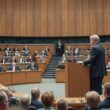A growing chorus of political voices in Germany is vehemently criticizing the Christian Democratic Union (CDU) for increasingly ambiguous positioning towards the right-wing populist Alternative for Germany (AfD), warning of a dangerous blurring of ideologies and a potential erosion of democratic principles.
Sören Pellmann, parliamentary group leader for the Left Party (Die Linke), launched a scathing rebuke of recent statements by CDU leader Friedrich Merz and parliamentary group leader Jens Spahn, arguing that attempts to maintain a symbolic “firewall” against the AfD while simultaneously employing similar rhetoric risk normalizing and even adopting the far-right party’s divisive language. Pellmann specifically targeted Merz’s characterization of migrants as a “problem in the cityscape” suggesting it represents a dangerous adoption of AfD narratives. He warned that this strategy will not weaken the AfD but rather “make the politics of the AfD part of the CDU” a development he deemed “extremely dangerous.
Thuringia’s Interior Minister Georg Maier (SPD) joined the criticism, accusing the CDU of losing its moral compass and exhibiting a lack of leadership. He underscored that Merz appears to be strategically tailoring his messaging ahead of the next federal election, seemingly attempting to build coalitions with the AfD before attempting to distance himself again. Maier emphasized the ideological chasm between the CDU and the AfD, asserting that the latter actively disavows the legacy of post-war German leaders Konrad Adenauer and Helmut Kohl, threatening to destabilize the European Union. He advocated for a ban on the AfD, citing the historic precedent of banning extremist parties in 1952 and drawing parallels to the urgent need to safeguard democracy.
Political scientist Julia Reuschenbach from the Free University of Berlin cautioned against any overtures from the CDU towards the AfD. Drawing on international comparative research, she highlighted that such alliances consistently backfire, weakening center-right parties and empowering extremist forces. Reuschenbach further pointed out that the AfD’s ambition isn’t genuine cooperation but rather the displacement of the CDU itself.
The escalating debate reflects deep concerns within the German political landscape about the potential implications of the CDU’s fluctuating stance and the broader normalization of right-wing extremism within mainstream discourse.





